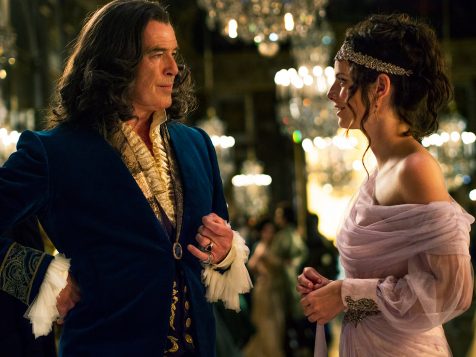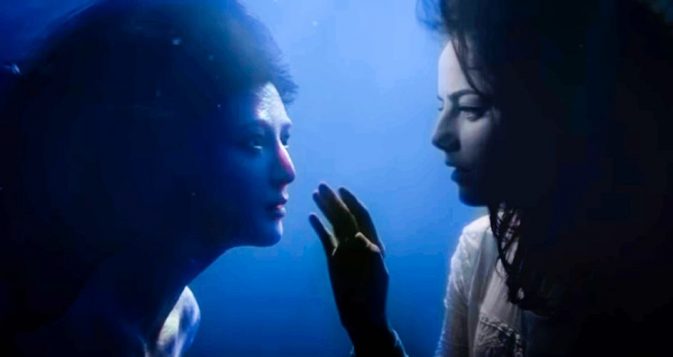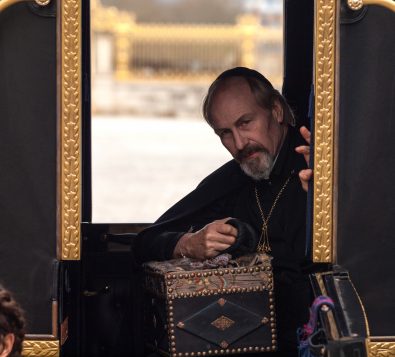Movie Review: Only love is immortal in ‘The King’s Daughter’
By Jeffrey Sanzel
Vonda N. McIntyre’s The Moon and the Sun (1997) blended science fiction and historical romance. The novel won the Nebula Award for Best Novel, besting George R. R. Martin’s A Game of Thrones. Among the book’s other accolades were a Publishers Weekly Best Book Award, Locus Recommended Book, and Intergalactic Award for Best Novel. Set in the seventeenth-century French court of King Louis XIV, the story follows the longest-reigning monarch’s search for immortality by ingesting an endangered sea monster’s flesh.
Talk of a movie version can be traced back to 2002, with Natalie Portman attached as the lead. But the film failed to be greenlit. Eventually, The Moon and the Sun was filmed in 2014, set for a 2015 release date, but the film remained on the shelf for nearly seven years. Various reasons have been proffered, including test audiences’ less than positive reaction to the visual effects and a tax evasion scandal involving the film’s mermaid, Fan Bingbing, China’s highest-paid female star. The film has finally been released under the title The King’s Daughter.
It has taken a quarter of a century for The Moon and the Sun to land on the big screen. But sadly, one suspects that this is not what McIntyre had in mind.
Choosing Julie Andrews as narrator probably seemed like a good idea on paper, but the once-upon-a-time illustrated prologue along with Andrews’ unique warmth and whimsy point towards Disney’s Beauty and the Beast. Unfortunately, the child-friendly prologue presents the wrong signals for what is—or at least should be—a darker tale.
The opening convent scene features Rachel Griffiths as the Mother Abbess channeling The Sound of Music as she disciplines Marie-Josèphe (Kaya Scodelario) for being too … well, too Maria von Trapp. The Abbess’ departing shot to the girl is that she is going “to a lavish, glimmering hell … where you no doubt will thrive.” If only.
The court seems to be short on courtiers. Outside of a scene of the king (Pierce Brosnan) addressing what looks like the peasants from a road company operetta, the population of Versailles seems to be on holiday. Perhaps they are off buying some of the strangely non-period dresses that occasionally pop up in the oddest places.
Quickly, with very little explanation other than a gift for music, she is whisked away to the court by the king’s personal confessor, Père La Chaise (William Hurt). Louis quickly elevates the feisty lass to court composer.
Meanwhile, sailor Yves De La Croix (Benjamin Walker) has found the sea creature (Bingbing). The villainous court doctor (Pablo Schreiber) has promised the monster’s heart and life force will grant the king eternal life. The mermaid must be sacrificed during the upcoming solar eclipse.
Louis shows particular interest in Marie-Josèphe, as she is his illegitimate daughter, spawning some of the most uncomfortable parent-child scenes ever found outside of the plays of Eugene O’Neill.
The mermaid’s singing draws Marie-Josèphe to the pool in which the creature is imprisoned. The musician uses the siren’s pinging vocalizations to inspire her composition, meeting the king’s immediate approval. In addition, the girl falls for the sailor. However, as the court is in dire financial straits, Louis wants Marie-Josèphe to marry the wealthy merchant-heir Jean-Michel Lintillac (Ben-Lloyd Hughes).
Barry Berman and James Schamus have taken a range of liberties with the source in fashioning their clumsy screenplay. Director Sean McNamara’s lack of nuance does nothing to enhance the performances. Teeth-grinding earnestness fills every line; emotion is replaced by slow motion. Brosnan is always charming and could have excelled in the role, but the writers could not commit to what they wanted their Sun King to be. His relationship with Hurt’s priest seems like lifted from a buddy movie. Scodelario alternates between pleasantly upbeat (though occasionally a bit rom-com) and crying.
Films of this ilk can be saved by style-over-substance. Lady-in-waiting Magali (Crystal Clarke) tells Marie-Josèphe that “color and bravado are the order of the day.” Again, if only. The filmmakers were granted access to shoot at Versailles. Somehow, they made the spectacular palace look cheap—as if shot in the producers’ Hampton’s backyard.
The royal ball in the Hall of Mirrors is a missed opportunity to showcase excess and opulence, further ruined by an excruciating father-daughter dance. The underground cave where they keep the mermaid is quasi-Pirates of the Caribbean (not the film—the ride). The special effects seem generated on an ancient laptop, with the final sequence particularly appalling.
After dithering about souls and morality, the final platitude is “only love is immortal.” Yes. But clear storytelling and character development can be nice, too.
Rated PG, The King’s Daughter is now playing in local theaters.









